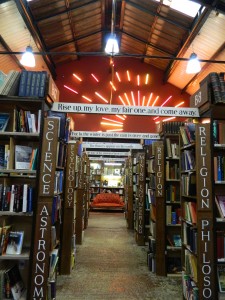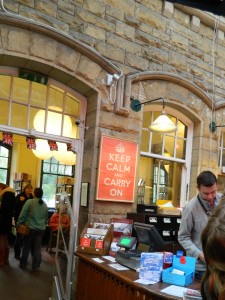Experiencing a Book Utopia
As I walked into the converted railway station, I caught my breath. Was this paradise?
People nestled around a crackling fire, gathering their hot drinks and cookies to settle in with a good book. I looked at the shelves, hardly knowing where to stay my gaze, titles vying for my attention. My fleeting glance took in a new biography about Anne Frank. A Second World War book my husband would like. The Kazuo Ishiguro novel I had lent out before reading and never got back.
 I ventured past the first room, my senses on overload. Above me was a massive mural of famous authors, commissioned by the owners. On the top of the stacks ran a miniature train, chugging along. Snippets of poetry sang from the walls and on signs between the stacks. I could hardly breathe, trying to take it all in.
I ventured past the first room, my senses on overload. Above me was a massive mural of famous authors, commissioned by the owners. On the top of the stacks ran a miniature train, chugging along. Snippets of poetry sang from the walls and on signs between the stacks. I could hardly breathe, trying to take it all in.
Philosophy, religion, biography, fiction. I moved into the main room not knowing where to start. All these volumes, so much love and care poured into their creation, then cast off by their first (or second, or third) owners. Now here to be discovered and loved again. Those from centuries gone by, locked in cabinets, their prices dear. Books from recent years, carefully arranged by category and alphabet.
I wandered throughout the stacks, fingering books, overwhelmed. After jumping from section to section, unable to form a systematic plan of browsing, I came upon an article from the Newcastle Journal featuring the owners of this amazing secondhand bookshop in Alnwick, Northumberland. Reading it filled my craving for setting and character related to this magnificent place, and my heartbeat started to slow.
Barter Books was the brainchild of an American woman and an Englishman – a strikingly good combination, I’d say. Mary and Stuart Manley met on a trans-Atlantic flight when Stuart, captured by the intriguing woman across the way, tried to figure out a way to meet her. He pondered through the first in-flight film and then hatched a plan. He dropped a note in her lap, saying, “If you want to talk to me, raise your hand.” Although she had requested a seat on her own, wanting to spend the time reading, she thought, “This is too good – so I raised my hand.” They talked the whole flight and married three years later.
Stuart’s passion had been for model trains, and he ran a small shop in the old Alnwick rail station for ten years, struggling to stay afloat with issues of cash-flow and never reaching comfortable success. Mary loved books, and on a trip to Lindisfarne to do some voluntary work she came up with the idea of starting a secondhand bookshop. “I thought maybe I could start a secondhand bookshop and call it Barter Books, have a little barter system.”

They started it in a tiny part of the building, and it soon became apparent that second-hand books were the way to go. They sold off the rail models, which cleared off their overdraft and enabled them to invest in remodeling the railway station – a strategy they have employed since they started the bookshop in 1991. As Mary says, “We’d make a bit of money and then throw it back into the shop. We still do – it’s our pleasure really and it’s good business too.”
The rail station was built in the 1880s and closed in 1968. It’s a massive structure for a small town, brought about by the influence of the Percy family, who have held the title of Duke or Earl of Northumberland since the Middle Ages. Stuart says, “They built this station because of the Duke of Northumberland and to impress visiting royalty and that kind of thing, so that it would be a showpiece for the North East Railway. It was only a 7,000 population town – it hardly merits a wooden hut never mind a twin-barrelled 32,000 square feet railway station.”

Barter Books not only breathes new life into a disused railway station and feeds booklovers’ obsession, it birthed a modern phenomenon. Early in the millennium, Stuart bought a lot of books at auction. Although the books weren’t worth much, a folded poster in one of them was: the now ubiquitous poster from the Second World War, “Keep Calm and Carry On.” They thought it was wonderful so hung it on the wall, and people started asking where they could buy it. They made copies and it became hugely famous. As Stuart says, “We had no idea when we found it that it was going to grow into such a monster.”
Mary adds, “We haven’t got rich on it because it’s out of copyright. In fact, we’ve learned what sharks there are out there. One man tried to sue us for selling any of it, because he wanted to establish a copyright for himself. You really learn.”

Pulse regulated, I was ready to browse the books, on the lookout for gems. I worked from one room to the other, spending the most time in the religion and biography sections. I was bemused to see a compilation book from my division when I was an editor at HarperCollins in the religion stacks, but was disappointed that the books on writing were on the paltry side. (Later, after I had made my purchase and was nearly ready to go, I discovered in a separate room the volumes on bookbinding and typesetting – an area to explore during my next visit.) I toyed with buying an early copy of Cranford by “Mrs Gaskell,” but decided I shouldn’t spend the money and bought the £2 film-tie-in paperback instead.
Your local bookshop might not live in a former railway station, but it too will house gems that only need uncovering. If we don’t support these vital repositories of stories, learning, and enrichment, they will become relics of an age gone by.
Thanks to Mary Manley for permission to include her and Stuart’s quotes from the interview with the Newcastle Journal. I happened upon her in the First Waiting Room during my second visit and enjoyed our conversation, two Midwesterners now living in the UK.
Leave a Reply